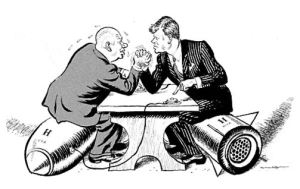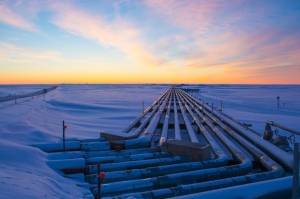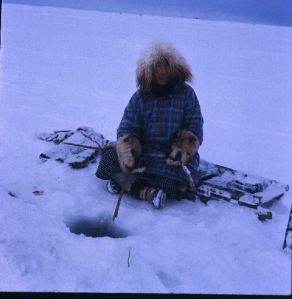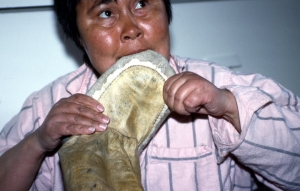In 1867, United States Secretary of State, William Seward, convinced President Andrew Johnson and the U.S. Senate to purchase the territory known as Aleyska from Russia. Many Americans viewed this as positive, however some thought it was a horrible idea and referred to the move as Seward’s Folly. One hundred and fifty years later, whether or not the Alaska Purchase was a colossal mistake is yet to be seen, but there are indications on both sides of the fence.
The primary reason for acquiring the land was that many Americans in the late 19th century believed Asia to be up and coming economically. They wanted the territory to serve as a means of trade between China, Japan, and the United States, envisioning an entire coastline of ports filled with merchant ships bringing low-cost goods across the Pacific.

Another reason wouldn’t be seen for a hundred years. During the height of the Cold War between the United States and the Soviet Union, the Russians placed missiles at our nearby neighbor, Cuba. The standoff between President Kennedy and Soviet Premier Nikita Khrushchev is famously remembered as the Cuban Missile Crisis and was a major turning point in our favor during the arms race. Imagine a scenario where Kennedy not only had to deal with short-range missile silos 90 miles off the coast of Miami, but also up and down the Southeastern panhandle of Alaska (near Juneau) – 300 miles from Seattle. A Soviet presence on the continent of North America might have enabled the Cold War to play out completely differently.

A third reason happened with the discovery of petroleum in the northernmost edge of the state, near Prudhoe Bay, in 1969. With the potential riches of oil, private companies came knocking on the very cold Alaskan door, and have been set up here for the last half century. Black gold has poured out of Alaska and that’s both good and bad. It’s good because the more domestic petroleum the United States can come up with, the less we are dependent on Middle Eastern suppliers like Saudi Arabia.
It’s bad because of the potential damage to the pristine environment up here (in fact, economist David Barker thinks the oil companies have yet to earn enough of a return on oil investment to justify the risks, and the federal government spends more governing the state than they get from the tax revenues), but the influx of funds into the mostly impoverished and rural Alaskan communities has become a double-edged sword.
The long-term effects of American involvement in the culture and lives of Native Alaskans have recently been shown to be far more negative than positive. In the 1970s, natives went to bat for themselves against the federal government and received the Alaska Native Claims Settlement Act, awarding the various tribes both monetary reimbursement and protected lands for their continued use and development. In addition, an annual stipend is provided to all Alaskan residents (regardless of ethnicity) from the tax revenues earned by the sale of Alaskan oil.

Additionally, most of the native population resides in remote and rural “Bush” villages (like the one where Jen and I now live) hundreds of miles from cities, paved roads, and infrastructure common in most other parts of the U.S. These scattered pockets of people struggle to survive in their traditional lifestyle: subsistence hunting, fishing, and gathering. They also fight against the influence of contemporary civilization: schools, hospitals, and government oversight. The natives are perfectly happy to reap the benefits of cooperation with the white man (electricity, cellular service, and European-style housing) without putting in any of the effort required on their part.
As I see it, the discovery of oil brought interest and investment into Alaska. It’s only fair that the native people get a piece of that pie. However, I also feel that as a culture, they have misappropriated that money. Individually, many natives are misusing those benefits to the detriment of their society, their families, and themselves. The combination of the remote location and never-ending free money from the government has stifled economic growth in the regions of Alaska outside the three major cities: Anchorage, Fairbanks, and Juneau. Natives don’t see the point in becoming educated because there are no jobs if they choose to remain in their community. If they obtain an education, there’s nothing in the villages to do with it; they would be forced to relocate to the Southeast just to utilize what they’ve learned.

Traditionally, the only education the natives got dealt with how to live off the land. And that was passed down by word of mouth through the generations. Elders taught their sons and daughters the skills of hunting and fishing as well as the crafts that enabled them to survive in such extreme cold and harsh winter climates: beaver hats, seal-skin mittens, and mukluks (heavy winter boots made from animal furs and walrus fat). Looking around at the villagers here, I notice that few are capable of their traditional skills and in succeeding in the American-style educational system. They’re stuck in the middle.
Students either drop out before graduation or simply graduate into perpetual unemployment to live in the welfare state that has become the native Alaskan villages. In some cases, the educated natives fill necessary roles managing the city (I have met a lot of hard-working and dedicated workers at the city office, health clinic, and public school); however, the rest feel like they are drowning in their depression – trapped between an unwanted way of life and another that appears to be slowly dying out. The suicide rate among Alaskans is the highest in the country (per capita).
Would the native culture have been better off underneath the leadership of the Soviet Union? Meh. Highly doubtful. But that doesn’t mean we can ignore the fact that whatever benefits America thought we were bringing the native population, by making Alaska an official state in 1959, have become overshadowed by the detrimental way in which the people in the Bush have chosen to exist.
An idle brain seems to be the devil’s playground – a cliché that is everything up here. Children and adults alike find themselves with loads of time on their hands and nothing to occupy it. So they get into trouble: alcoholism and drug abuse, vandalism, and assaults and rapes run rampant throughout the villages.
(Point of fact: rape in Alaska is three times the national average and child sexual assault is nearly six times – those are conservative estimates since most offenses go unreported due to the fact that the perpetrator is also the family’s means of survival – hunting, cutting wood, and bringing water in – and in some villages the rate of violence against women is 100%).
As with everything they seem to do, the federal and state governments are great at staring a problem in the face and then only doing a small fraction of the work necessary to solve it. Is it up to the government to figure everything out? Certainly not, however, when the people here don’t seem to be able to help themselves, whose responsibility is it to enact the changes required to save an entire culture? Nobody wants to bear that burden, not the government, not the village elders, or any of the natives themselves. There’s only so much money can do, and in Alaska, it seems that handouts aren’t fixing anything. Too bad Seward didn’t have a crystal ball, else he might have not spent the money on Alaska.
Until Next Time…
-Justin
Wow! Excellent article. Scary in many ways.